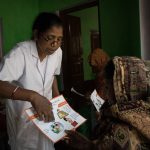HEALTH
 18 year old Gudiya Devi recently got married to Sunil Kumar and lives with her in-laws in Dobhi block, Gaya district, Bihar. Marriage at a young age followed by an early pregnancy is a common trend in her village. After marriage, the couples do not use any modern method of contraception. Soon after her marriage she witnessed the death of a neighbour during childbirth. Considering the woman who passed away was of the same age like Gudiya, she got to know about the dangers associated with early pregnancy. Due to concerns for her own health in case of an early pregnancy, along with financial pressures of the family she decided to find out more about family planning.
18 year old Gudiya Devi recently got married to Sunil Kumar and lives with her in-laws in Dobhi block, Gaya district, Bihar. Marriage at a young age followed by an early pregnancy is a common trend in her village. After marriage, the couples do not use any modern method of contraception. Soon after her marriage she witnessed the death of a neighbour during childbirth. Considering the woman who passed away was of the same age like Gudiya, she got to know about the dangers associated with early pregnancy. Due to concerns for her own health in case of an early pregnancy, along with financial pressures of the family she decided to find out more about family planning.
Zero and Low Parity Pilot facilitator (ZLPP) is an initiative by CARE India to increase capacity and skills of the frontline workers. A frontline worker mainly focusses on taking health services directly to communities, where access is often limited. The idea behind this project is to ensure better quality information to the couples leading to increased knowledge, behaviour and practices of nulliparous and low parity girls and women. Better information can help them make better choices and stronger negotiating skills. Awareness on Sexual & Reproductive Health (SRH) Rights can lead to planed pregnancy.
Two-thirds of the population of Gaya lives in rural areas, where access to basic health services limited. But Gudiya is lucky. Every month 2-3 times the ASHA outreach team visits her village to provide access to life-changing family planning services. During one of the visits by a ZLPP Coordinator, the staff interacted with her and she voiced her opinion for not having a baby right now as it can be dangerous at her age.
On a subsequent visit, Gudiya and her husband were approached by the team during a home visit. The ZLPP staff requested both husband and wife be counselled together for a better decision. The staff advised them on a range of modern family planning methods, including condoms, oral contraceptive pills and long-term methods such as Copper-T and injectables. A session consultation took place along with new information including benefits and side effects of all the methods. They took the decision of accepting a family planning method and they chose Antara injectable as they were not planning to have a baby in the next one year.
When the decision was made our staff ensured that they visit the nearest health facility where Antara was available, which was the Dobhi PHC. Once they reached the facility, they were again counselled by the Medical Officer in Charge (MOIC) who was trained under the Antara program. The procedure took just a couple of minutes and it was performed by the MOIC himself.
After the procedure, she shared her relief, “I am very happy I got this done. It’s over now. There was no pain and I am going to be fine now.” The MOIC informed her about the schedule of the subsequent dosage and the expected side effects. In case of any problems, she was informed that she could contact the ZLPP staff or even the facility directly.
Gudiya is one of the fortunate ones. Millions of women still do not have access to modern contraception and continue to have early pregnancy.




